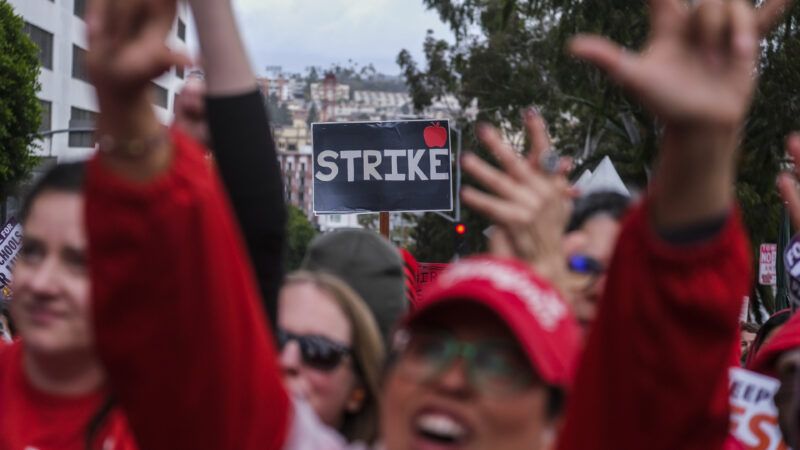Public Employee Unions Rule California
Expect more strikes, fewer government services, and more tax increases to pay for pension obligations.

One official remarked years ago that his county essentially was a pension provider that offered a few public services on the side. It was a snarky reminder that public-employee compensation—especially those exorbitant pensions paid at relatively young ages—consumed the bulk of municipal budgets. It's the tail wagging the dog.
The same dynamic is at work at the state level. State Sen. Steve Glazer (D–Orinda) last month made waves for a column he penned in The Los Angeles Times. Commenting on the recently passed $310-billion budget that ramps up funding for all the usual progressive priorities, he dared to say what everyone in Sacramento knows—even if saying so breaks social taboos.
"(W)e've already spent billions of dollars on the same problems—with very little to show for it," he wrote. "Our failures are evidence that good intentions and lots of money are not enough to fix what ails the Golden State. To make our progressive beliefs mean anything, the Legislature must ensure that the money we spend is actually improving the lives of the people we say we are committed to helping."
His "solutions" aren't significant enough to mention in detail, but Glazer made reference to "special interest demands" and legislators "caving in to the unions." That at least acknowledges the proverbial elephant in the room. Public employee unions exert excessive influence and capture the bulk of new spending for themselves. It's not only a Democratic problem. The state GOP is beholden to the biggest offenders (police and firefighters' unions).
This session, Assemblyman Heath Flora (R–Modesto) authored Assembly Bill 1254, which would grant automatic pay raises forever to state firefighters to bring their current average compensation ($200,000 to $253,000 a year) up to the rates of better-compensated municipal firefighters, which pay 15% to 40% more. This Editorial Board referred to the bill as "hands down the most irresponsible union-giveaway proposal this year."
If you wonder why there's never enough money and why lawmakers always look for new ways to raise taxes, then take a look at the Transparent California website, which details state and local compensation packages. For instance, I count more than 200 California Highway Patrol employees who in 2022 earned above $400,000 in total compensation, with the top earner receiving $777,000.
This year, California faced a $32-billion deficit, which lawmakers closed through kick-the-can accounting gimmicks and some cuts to the climate-change spending bonanza. Public employees were spared any pain and some bargaining units received pay bumps even though there's no guarantee we'll soon be back in black. Gov. Gavin Newsom and Democratic supermajorities managed to avoid tough choices.
In 2012, California faced similarly sized deficits. The budget drama, coupled with news reports of struggling pension systems and outrageous pension benefits, sparked a pension-reform movement. Voters in Democratic-dominant San Jose overwhelmingly approved a pension-reform ballot measure 2012, which later was thrown out by the courts. A union-friendly state agency (the Public Employment Relations Board) and courts also derailed a 2012 reform measure in San Diego.
Despite those setbacks, the measures highlighted public support for reining in out-of-control pension obligations that sap budgets and enrich politically powerful union members. As part of his budget, then-Gov. Jerry Brown spearheaded and signed a modest (but useful) pension-reform law known as the Public Employees' Pension Reform Act (PEPRA). It went into effect in 2013. Since then, the state has veered even further left and no one even bothers anymore.
In her recent Orange County Register column spotlighting one Los Angeles fire captain who earned $510,000 in overtime last year (for total compensation of $699,000), Teri Sforza detailed the shocking setbacks we've seen since the 2012. She focused on overtime: "In 2012, only 213 city workers earned overtime of at least $100,000. Last year, 3,680 did. … In 2012, 3,814 city workers earned at least $50,000 in overtime. Last year, 16,699 did."
The overtime system seems designed to boost pay. And, of course, public employee pay and pension payouts have continued on an upward trajectory in the past 11 years. But it's never enough. Lately, we're seeing an emboldened public employee union effort that has led Los Angeles city workers to recently go on strike. Last month, the same agency (PERB) that largely killed off the San Diego pension measure has gutted San Francisco's charter provisions forbidding public employees from going on strike.
Mission Local noted that such provisions were "enacted following chaotic 1970s-era public employee walkouts." Hey, the nation is enduring Jimmy Carter-style inflation, so why not throw bouts of labor unrest into the mix just for nostalgia's sake? And everyone is getting in on the action, as highly paid prison doctors and psychiatrists authorized a strike early this month.
Let's just admit to reality: Taxpayers actually work for our public employees rather than the reverse. As long as that's the case, public services will never improve and your tax burden will only increase.
This column was first published in The Orange County Register.


Show Comments (121)